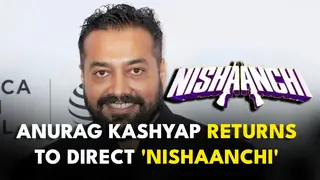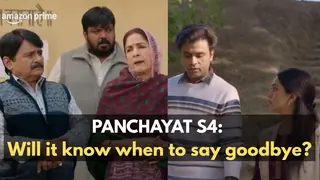'Gram Chikitsalay' Review: Panchayat-ification Diagnosed, Script Needed a Better Prescription
Despite everything—despite the recycled tropes, the wandering screenplay, the unfulfilled potential—Gram Chikitsalay is still worth your time. Because even when TVF stumbles, it stumbles with dignity.
Published: Thursday,May 08, 2025 18:30 PM GMT-06:00

Gram Chikitsalay
Streaming on Amazon Prime Video May 9 onwards
Rating - **1/2 (2.5/5)
Cast: Amol Parashar, Vinay Pathak, Akansha Ranjan, Akash Makhija, Garima Vikrant Singh, Anandeshwar Dwivedi & more
Directed by: Rahul Pandey
Created & Original Story by: Deepak Kumar Mishra & Arunabh Kumar
It has been well over a decade—12 to 13 years to be precise—since The Viral Fever, or TVF, made its quiet yet seismic entry into the Indian digital entertainment space. Since then, the fine minds at TVF have treated us to an enviable buffet of exceptional content, both under their flagship and via cleverly extended creative tendrils across various other platforms and banners. One thing has remained a rare and stubborn constant through all these years: there cannot be a bad TVF show.
This seemingly impossible standard has, to their immense credit, mostly held water. Even the most underwhelming effort by this brilliant troupe of creators stands heads, shoulders, and a few clever punchlines above a sea of mediocrity that defines much of Indian streaming content today. One is almost tempted to ask: Can TVF go horribly wrong? The answer—thankfully—is a resounding no. But, that brings us to Gram Chikitsalay, a show that, while not a catastrophic misstep by any means, certainly feels like it limps a little on arrival.
First things first. The comparison between Gram Chikitsalay and Panchayat isn’t lazy shorthand or a facile parallel drawn for the sake of it. It practically leaps out at you. And, like any good viewer invested in nuance and the avoidance of premature judgment, I was fully prepared to discard preconceived notions. Unfortunately, it seems like the show isn’t quite ready to do that itself—and that, my friends, is where the malaise begins.
Creators Arunabh Kumar and Deepak Kumar Mishra are masters of the lived-in texture of village life, of the tiny emotional tremors that make the mundane poetic, and of using humor not as a distraction but as a window into empathy. These are no small feats. And it is these very strengths that redeem the series from its structural missteps.
-

We are promptly introduced to the charming, well-meaning, and endearingly naive Dr. Prabhat (played with signature softness and spirited angst by Amol Parashar). Prabhat, in an unusual and thus somewhat suspect burst of idealism, has willingly chosen to take up the position of Medical Officer at the village health center—Gram Chikitsalay—in the quaint and rather picturesque Bhatkandi, which is supposedly nestled in the rustic heartlands of Jharkhand.
This choice, as it turns out, is as complicated as it is noble. On arrival, Prabhat is faced with a plethora of challenges: lack of infrastructure, an alarming absence of medical literacy among the villagers, and perhaps most frustratingly, the existence of an unofficial, self-styled village doctor—Chetak (Vinay Pathak in a curious, half-baked adversarial avatar)—who, despite knowing next to nothing about actual medicine, commands the unwavering loyalty of the local populace.
From here, the narrative unfolds around Prabhat’s uphill battle to simply be seen as the legitimate practitioner. He is so utterly underutilized that he struggles to acquire even a single patient—and when he finally does, it happens under the most ludicrous and unpredictable of circumstances. One begins to wonder whether the Gram Chikitsalay is a place of healing or an elaborate metaphor for the chronic dysfunction of rural systems.

Even as I write this, summing up the overarching plot, I can’t help but reflect on how Gram Chikitsalay seems to be suffering from what I will hereby dub Panchayatitis—a creative affliction where TVF, quite unintentionally perhaps, finds itself in thrall to its own past success. From narrative structure to character arcs, there are eerie similarities: a young protagonist voluntarily moving to a village (a twist on Panchayat’s reluctant arrival), finding an odd camaraderie with two subordinates, a brewing romantic subplot, political machinations as plot-fodder, and of course, the inevitable arc of a supporting character becoming the emotional lynchpin—dare I say, the Prahlad Chacha of it all. This is not homage. This is replication. And that is baffling.
The crux of this issue boils down to the show's clunky and inconsistent screenplay. While the duo of Vaibhav and Shreya remain pitch-perfect with their writing of dialogues—laced with charm, wit, and cultural authenticity—the screenplay lacks focus. Even in its tightly packed five-episode format, the show fumbles in establishing narrative continuity. Just as you begin to settle into a rhythm, the script veers off to accommodate a new subplot or thematic twist that contributes little to the story’s grander momentum. It often feels like they are grasping for threads to stitch a patchwork instead of weaving a cohesive narrative fabric.
Another missed opportunity arrives in the form of Vinay Pathak’s Chetak. With an actor of his calibre, one anticipates a layered antagonist—perhaps even a reluctant frenemy. But the relationship between Prabhat and Chetak never quite gets the simmering tension or dramatic payoff it promises. Apart from a striking monologue-esque moment, Pathak’s character remains woefully undercooked. The show hints at a confrontation that never quite escalates, thereby leaving viewers mildly dissatisfied and wondering what could have been.
In the final diagnosis, Gram Chikitsalay is not a knockout. It is, quite clearly, one of the more underwhelming outings from the TVF stable—a rarity that feels almost sacrilegious to say aloud.
-

And yet, as has been reiterated—and must be once more—the TVF DNA shines through, even in this flawed iteration. The beating heart of Gram Chikitsalay is still very much present in the small moments: the awkward silences, the clever observations, the humanistic gaze, and the pulse of rural India rendered without cartoonish exaggeration.
Creators Arunabh Kumar and Deepak Kumar Mishra are masters of the lived-in texture of village life, of the tiny emotional tremors that make the mundane poetic, and of using humor not as a distraction but as a window into empathy. These are no small feats. And it is these very strengths that redeem the series from its structural missteps.
The ensemble cast is another stronghold. There’s a reliable rhythm in the supporting characters, with Akash Makhija, Garima Vikrant Singh, Anandeshwar Dwivedi, and Santoor Kumar lending warmth and color to the setting. They are never reduced to background noise, and their performances reflect the confident direction and casting sensibilities that TVF has always had a knack for. Akansha Ranjan, despite limited screen time, manages to bring some depth and presence to her role, suggesting a larger arc that could bear fruit in subsequent seasons—if there are any.

But the real torchbearer here is Amol Parashar. Long burdened (and perhaps boxed in) by the Chitvan image that once catapulted him into the public consciousness, Parashar proves again that he is much more than that charmingly erratic traveler. In Gram Chikitsalay, he plays Dr. Prabhat with restraint, intelligence, and just the right amount of exasperated vulnerability. It’s a performance that grounds the show even when the plot around him stumbles. He isn’t trying to win the village over with flamboyance or melodrama; he’s just trying to do his job—and that, in its simplicity, is powerful.
In the final diagnosis, Gram Chikitsalay is not a knockout. It is, quite clearly, one of the more underwhelming outings from the TVF stable—a rarity that feels almost sacrilegious to say aloud. The creators must surely have known the shadow of Panchayat loomed large over this one, and yet they seemed to walk into it willingly, perhaps in the belief that this story had enough heart to stand on its own. That belief is commendable. The execution, however, doesn't quite rise to meet it.

And yet, despite everything—despite the recycled tropes, the wandering screenplay, the unfulfilled potential—Gram Chikitsalay is still worth your time. Because even when TVF stumbles, it stumbles with dignity. It stumbles with grace, with vision, and most importantly, with a heart that continues to beat to the rhythms of real India. And that, as any TVF loyalist will tell you, is more than what can be said for the avalanche of glossy, soulless content that floods our screens these days.
So no, this isn’t TVF’s best work. Not by a long mile. But is it a failure? Absolutely not. It is a gentle reminder that even the most accomplished storytellers are allowed to have quieter, more faltering chapters. And as far as chapters go, this one, while uneven, still manages to stay true to the book TVF has been writing all along.
Join Our WhatsApp Channel
Stay updated with the latest news, gossip, and hot discussions. Be a part of our WhatsApp family now!
Join NowYour reaction
 Nice
Nice Great
Great Loved
Loved LOL
LOL OMG
OMG Cry
Cry Fail
Fail





















1 Comment